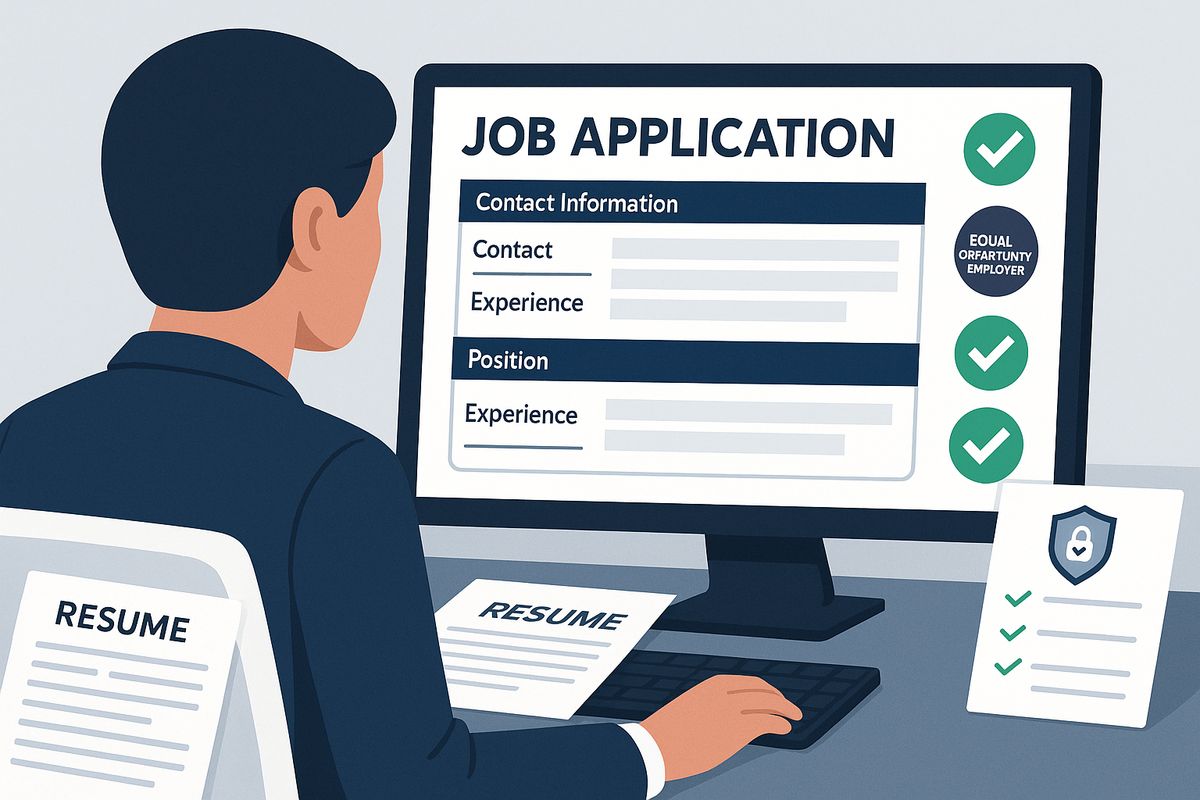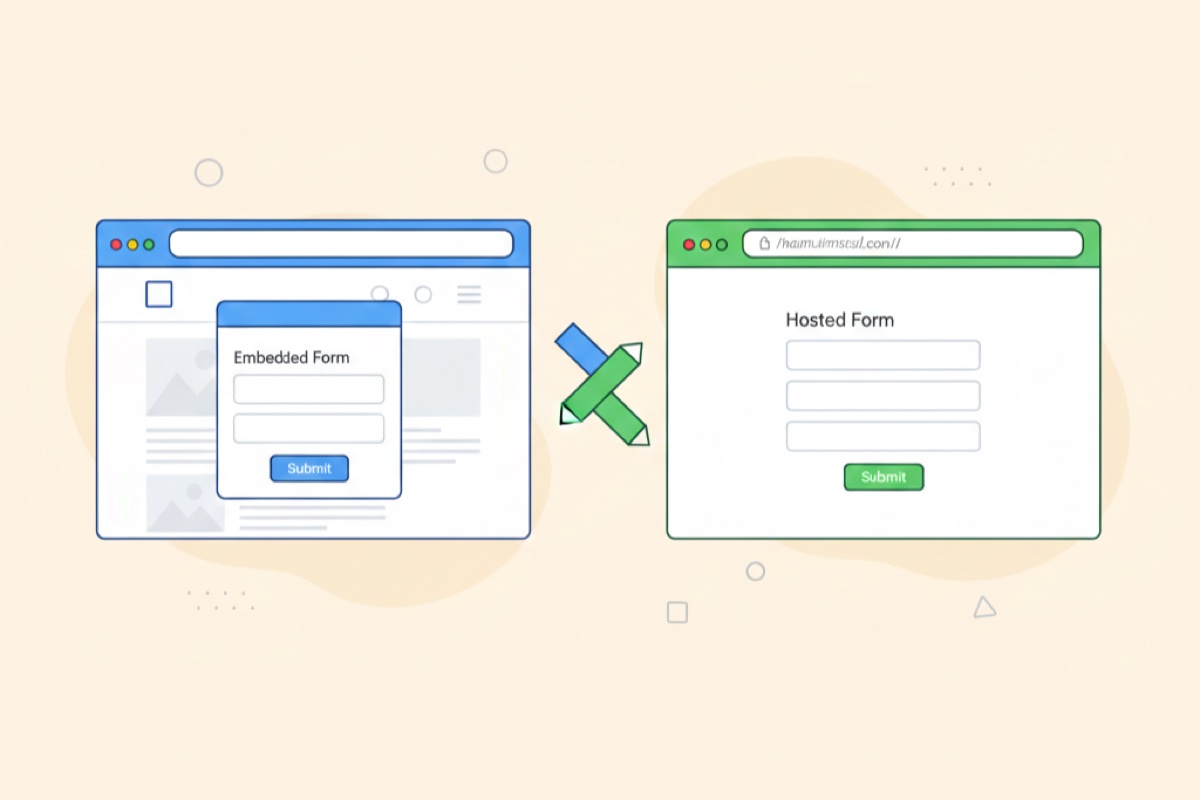Job application forms are the foundation of your hiring process. But one wrong question can expose your company to discrimination lawsuits, EEOC complaints, and serious legal liability. The line between collecting information you need and asking illegal questions is clearer than most employers realize—yet violations are shockingly common.
This guide will show you exactly what you can and cannot ask on job application forms, how to structure compliant applications, and best practices for collecting the information you need to make informed hiring decisions while protecting your organization legally.
Important: This guide provides general information about employment application practices in the United States. It is not legal advice. Always consult with an employment attorney to ensure your specific applications comply with federal, state, and local laws in your jurisdiction.
Why job application compliance matters
Getting job applications wrong carries serious consequences:
Legal and financial risks
- EEOC complaints: Discrimination charges can result from illegal questions even if you don't hire the candidate
- Lawsuits: Both individual and class action lawsuits for discriminatory hiring practices
- Financial penalties: Fines, settlements, and legal fees can easily reach six or seven figures
- Reputation damage: Public discrimination claims harm employer brand and recruiting efforts
The legal framework
Multiple federal laws govern what you can ask on job applications:
- Title VII of the Civil Rights Act (1964): Prohibits discrimination based on race, color, religion, sex, or national origin
- Age Discrimination in Employment Act (ADEA): Protects applicants 40 and older
- Americans with Disabilities Act (ADA): Prohibits discrimination based on disability
- Genetic Information Nondiscrimination Act (GINA): Prohibits questions about genetic information
- State and local laws: Often provide additional protections (criminal history, salary history, credit checks)
The principle: You cannot ask questions that could be used to discriminate against protected classes unless the information is directly related to a bona fide occupational qualification (BFOQ).
What you can legally ask on job applications
Let's start with the safe questions—information clearly job-related and legal to collect:
Basic contact information
Always legal:
- Full legal name
- Email address
- Phone number
- Mailing address or city/state of residence
- Preferred method of contact
Why it's legal: This information is necessary for communication and doesn't relate to protected characteristics.
Work authorization and eligibility
Legal question: "Are you legally authorized to work in the United States?"
Legal question: "Will you now or in the future require sponsorship for employment visa status?"
Illegal question: "What is your citizenship status?" or "Where were you born?"
Why the distinction matters: You can verify work authorization but cannot discriminate based on national origin or citizenship status (except where required by law).
Job qualifications and experience
Always legal to ask about:
- Work experience and employment history
- Educational background (degrees, certifications, schools attended)
- Professional licenses and certifications
- Technical skills and competencies
- Language skills if job-related
- Availability to work required hours/schedule
- Willingness to travel if job requires it
- Willingness to relocate if position requires it
Best practice: Focus all questions on job requirements. Can the applicant perform the essential functions of the job?
References and background checks
Legal to request:
- Professional references (names, relationships, contact info)
- Permission to contact previous employers
- Authorization for background checks (with proper disclosure)
- Authorization for drug testing (where legal and job-related)
Requirements:
- Background checks must comply with Fair Credit Reporting Act (FCRA)
- Provide proper disclosure and obtain written consent
- Follow adverse action procedures if you don't hire based on background check
Schedule and logistics
Legal questions:
- "Are you available to work [specific hours, days, shifts]?"
- "Can you work overtime when required?"
- "Are you available to start on [date]?"
- "This position requires travel X% of the time. Can you meet this requirement?"
Important: These questions must relate to actual job requirements, not used to screen out parents, caregivers, or religious observers.
Ability to perform job functions
Legal question: "Can you perform the essential functions of this job with or without reasonable accommodation?"
Legal follow-up if yes with accommodation: "What accommodations would you need?" (asked after conditional job offer only)
Illegal question: "Do you have any disabilities?" or "What medical conditions do you have?"
What you absolutely cannot ask
These questions are illegal on job applications in most or all circumstances:
Age and date of birth
Illegal:
- "What is your date of birth?"
- "What year did you graduate high school?"
- "How old are you?"
Legal alternative: "Are you 18 years or older?" (if minimum age is a legal requirement for the position)
Why it's illegal: Age discrimination is prohibited for workers 40 and older under ADEA. Asking for age invites discrimination claims.
Exception: After hiring, you can collect date of birth for benefits administration and record-keeping.
Marital and family status
Illegal questions:
- "Are you married?"
- "Do you have children?"
- "Are you pregnant or planning to become pregnant?"
- "What are your childcare arrangements?"
- "What does your spouse do?"
Why it's illegal: Can be used to discriminate based on sex, family status, or pregnancy. These questions disproportionately screen out women.
What about emergency contacts? Legal to collect after hiring, not on initial application.
Race, color, and national origin
Illegal questions:
- "What is your race?"
- "Where were you born?"
- "What is your native language?"
- "What country are you from?"
- Photo requests that could reveal race
Legal alternative for language: "What languages do you speak fluently?" (only if language skill is a bona fide job requirement)
EEOC data collection: You can collect demographic data for EEOC reporting, but it must be:
- Separate from the application
- Clearly voluntary
- Not used in hiring decisions
- Kept confidential from hiring managers
Religion and religious practices
Illegal questions:
- "What is your religion?"
- "What religious holidays do you observe?"
- "Do you attend church?"
- "Can you work on Sundays?" (if asked to screen out religious observers)
Legal approach: State the work schedule requirements: "This position requires Saturday work." Let applicants decide if they can accommodate the schedule.
After hiring: Employers must provide reasonable accommodation for religious practices unless it creates undue hardship.
Disability and health information
Illegal questions (pre-offer):
- "Do you have any disabilities?"
- "Have you had any serious illnesses?"
- "How many sick days did you take last year?"
- "Do you take any prescription medications?"
- "Have you filed workers' compensation claims?"
Legal approach: "Can you perform the essential functions of this job with or without reasonable accommodation?"
After conditional job offer: You can require medical exams if required for all employees in the same job category.
Criminal history (varies by location)
Increasingly restricted by "ban the box" laws:
Many states and cities prohibit asking about criminal history on initial applications. You must wait until later in the hiring process.
Where allowed, you can ask:
- "Have you been convicted of a felony in the last [X] years?"
- Some jurisdictions limit this to job-related convictions only
You generally cannot ask:
- About arrests without convictions
- About sealed or expunged records
- Overly broad questions about all criminal history
Best practice: Research laws in your jurisdiction. Many areas require individualized assessment considering the nature of the crime, time passed, and job requirements.
Financial and credit history
Restricted in many states:
Some states prohibit or limit credit checks for employment purposes.
If permitted:
- Must have legitimate business reason (handling money, security clearance)
- Must comply with FCRA requirements
- Provide required disclosures and get written authorization
Generally illegal to ask:
- "Do you own your home?"
- "Do you have a car?" (unless transportation is a job requirement)
- "Have you declared bankruptcy?"
Salary history
Banned in many states and cities:
A growing number of jurisdictions prohibit asking about salary history to prevent pay discrimination from following people throughout their careers.
Where banned, you cannot ask:
- "What is your current salary?"
- "What was your salary at your last job?"
- "What are your salary expectations?" (in some jurisdictions)
Legal alternative: State the salary range for the position and ask if the candidate finds it acceptable.
Structuring compliant job application forms
Now that you know what's legal and illegal, here's how to structure effective, compliant applications:
Recommended application structure
Section 1: Position and contact information
- Position applying for
- Full name
- Email address
- Phone number
- Mailing address or city/state
Section 2: Work authorization (if required)
- "Are you legally authorized to work in the United States?"
- "Will you now or in the future require visa sponsorship?"
Section 3: Qualifications and availability
- "Do you meet the minimum qualifications stated in the job posting?"
- "Are you available to work [required schedule/hours]?"
- "Can you perform the essential functions of this position with or without reasonable accommodation?"
- "Are you available to start on [date] or sooner?"
Section 4: Education
- Schools attended
- Degrees earned
- Certifications and licenses (if job-related)
- Note: Don't ask graduation dates (reveals age)
Section 5: Work experience
- Previous employers
- Job titles
- Dates of employment (month/year is sufficient)
- Key responsibilities
- Reason for leaving (optional)
- May we contact this employer? Yes/No
Section 6: Skills and qualifications
- Relevant technical skills
- Software proficiency
- Language skills (if job-related)
- Professional certifications
Section 7: Additional information (optional)
- Open text: "Is there anything else you'd like us to know?"
- Links to portfolio, LinkedIn, professional website
Section 8: References
- Professional references (name, relationship, contact info)
- Typically 3 references
Section 9: Acknowledgments and authorizations
- Certification that information is accurate and complete
- Understanding that false information is grounds for dismissal
- Authorization to verify information
- At-will employment disclaimer (if applicable)
- Signature and date
Multi-step form best practice
Job applications tend to be longer than other form types. Using multi-step forms improves completion rates significantly:
Recommended page structure:
Page 1: Position and contact (quick, builds momentum)
Page 2: Work authorization and qualifications (screening questions)
Page 3: Education
Page 4: Work experience (most time-consuming section)
Page 5: Skills and additional info
Page 6: References and authorizations
With AskUsers, you can create multi-step application forms using page breaks with progress indicators, making long applications feel manageable and increasing completion rates.
Resume and cover letter collection
Most job applications also collect resumes and cover letters:
Document collection options
Option 1: Collect via external tools
- Use AskUsers for structured application data
- Use email or file-sharing for resume/cover letter
- Include instructions in application form
Option 2: URL/link collection
- Add URL field to application form
- Applicants upload resume to Google Drive, Dropbox, personal website
- Share link in application
Option 3: Integrated applicant tracking systems
- Use dedicated ATS platforms (Lever, Greenhouse, BambooHR) for resume management
- Use AskUsers for supplementary questions or screening forms
- Best for high-volume hiring or complex recruiting needs
Instructions for document submission
Use content blocks in your application form to provide clear instructions:
Example content block:
"Please submit your resume and cover letter by email to careers@company.com with subject line: Application - [Position Title] - [Your Name]"
"Accepted formats: PDF, Word (.doc/.docx). Maximum file size: 5MB."
Data privacy and security considerations
Job applications contain sensitive personal information. Proper handling is both a legal and ethical obligation:
GDPR compliance (for EU applicants)
If you accept applications from EU residents, you must comply with GDPR:
Requirements:
- Provide clear privacy notice explaining how you'll use data
- Collect only necessary information
- Obtain consent for data processing
- Allow applicants to access, correct, or delete their data
- Establish data retention policies
- Implement appropriate security measures
AskUsers includes GDPR compliance features with consent management, privacy controls, and data handling transparency.
Data retention policies
Best practices:
- Keep applications for hired candidates as part of personnel file
- Retain applications for non-selected candidates for 1-2 years (EEOC recommends 1 year minimum)
- Document your retention policy
- Securely destroy applications after retention period
- Honor deletion requests where legally required
Secure data handling
- Store application data securely with access controls
- Limit access to hiring managers and HR only
- Use encrypted transmission (HTTPS)
- Don't share applicant data externally without consent
- Train staff on privacy and confidentiality
AskUsers provides secure data transmission and storage, with options to export application data to secure systems for long-term retention.
EEO data collection (separate from application)
Employers with 15+ employees must comply with EEO reporting requirements:
What you can collect for EEO purposes
- Gender
- Race/ethnicity
- Veteran status
- Disability status (voluntary self-identification)
Critical requirements
Must be separate from the application:
- Create a separate EEO form, not part of the job application
- Clearly mark as voluntary
- Store separately from applications
- Never share with hiring managers
- Use only for reporting and compliance
Required disclaimer language (paraphrased):
Example EEO disclosure:
"We are an equal opportunity employer and comply with all applicable federal, state, and local fair employment practices laws. This information is collected for statistical purposes in accordance with federal regulations. Completion is voluntary, and your responses will not affect your application. This form will be kept separate from your application and will not be accessible to hiring managers."
You can create a separate survey with AskUsers specifically for EEO data collection that applicants complete after submitting their application.
Special considerations for different industries
Healthcare and medical positions
Additional legal considerations:
- Can require licensure verification
- May require background checks and drug screening (with proper disclosure)
- Cannot ask about disabilities until after conditional offer
- Immunization requirements must be job-related and consistent with business necessity
Financial services and roles with fiduciary responsibility
May be able to ask about (where legal):
- Credit history (in jurisdictions that permit it)
- Bankruptcy history (with limitations)
- Financial certifications and licenses
Must comply with:
- FCRA disclosure and authorization requirements
- Adverse action procedures
- State-specific restrictions on credit checks
Positions requiring security clearances
More extensive background information may be required:
- Detailed work history with minimal gaps
- References covering specific time periods
- Foreign contacts and travel
- Financial information
Must still comply with:
- Anti-discrimination laws
- Proper disclosure of why information is needed
- Only collect information required for clearance process
Driving positions (delivery, transportation, sales)
Can ask about:
- "Do you have a valid driver's license?"
- "What class of license do you hold?"
- Driving record (as part of background check with proper disclosure)
Cannot ask:
- "Do you own a car?" (unless car ownership is a genuine job requirement, not just having transportation)
Managing the application process with AskUsers
Here's how to use AskUsers effectively for job application collection and management:
Setting up your application form
Step 1: Create multi-step structure
- Use page breaks to organize into logical sections
- Add progress indicator so applicants know how far along they are
- Keep most time-consuming sections (work experience) in the middle
Step 2: Add job description and requirements
- Use content blocks at the beginning to display full job description
- Include salary range (required in many jurisdictions)
- List required qualifications clearly
- Describe company culture and benefits
Step 3: Include only legal questions
- Review every field against the legal guidelines in this article
- Focus on job-related qualifications
- Avoid any questions about protected characteristics
Step 4: Add required disclaimers
- Use content blocks to include legal notices
- At-will employment statement (if applicable)
- Equal opportunity employer statement
- Background check disclosure (if planning to conduct checks)
- Privacy policy and data handling notice
Step 5: Configure notifications
- Set up email notifications to hiring managers
- Send confirmation emails to applicants
- Set expectations for follow-up timeline
Collecting and managing applications
View submissions in dashboard:
- Review all applications in one place
- See submission timestamps
- Filter and search applications
Export for review and ATS:
- Download applications as CSV
- Import into spreadsheet for tracking
- Import into your ATS if using one
- Share with hiring team securely
Track application analytics:
- Monitor completion rates (low rates suggest form is too long or confusing)
- Identify abandonment points
- See average completion time
- Track traffic sources to optimize job posting placement
Embedding on careers pages
Inline embedding:
- Embed application form directly on job posting pages
- Match your website's branding with custom styling
- Provide seamless application experience
Hosted form links:
- Share application link in job postings on external sites
- Include in email outreach to potential candidates
- Add to social media job announcements
After applications: Interview and offer stage compliance
Legal compliance doesn't end when the application is submitted:
Interview questions
The same rules that apply to applications apply to interviews:
Cannot ask about:
- Age, marital status, family, religion, disability, national origin
- Salary history (in jurisdictions where banned)
Can ask about:
- Work experience and qualifications
- Hypothetical job scenarios
- Why they're interested in the position
- Their understanding of job requirements
Background checks and medical exams
Background checks:
- Provide FCRA disclosure and obtain written authorization
- Can conduct after application but before hiring
- Follow adverse action procedures if not hiring based on results
- Consider individualized assessment for criminal history
Medical exams and drug testing:
- Can only require after conditional job offer
- Must be required for all entering employees in same job category
- Cannot selectively test certain candidates
- Results must be kept confidential and separate from personnel files
Making the offer
Once you make a conditional offer, you can ask about:
- Date of birth (for benefits and record-keeping)
- Emergency contact information
- Details needed for onboarding (tax forms, direct deposit)
Common mistakes that lead to legal problems
1. Copying applications without legal review
Don't copy application forms from online templates or other companies without having them reviewed by an employment attorney. Laws vary by state and change frequently.
2. Asking "innocent" questions with legal implications
Questions like "What year did you graduate?" or "Do you have reliable childcare?" may seem harmless but can expose you to discrimination claims.
3. Inconsistent application process
Asking follow-up questions to some candidates but not others (especially related to protected characteristics) creates discrimination risks.
4. Not updating forms for law changes
Employment laws change regularly. Ban the box laws, salary history bans, and other restrictions are constantly evolving. Review applications annually with legal counsel.
5. Poor data security
Storing applications in unsecured locations, sharing with too many people, or failing to destroy them after retention periods violates privacy expectations and may violate laws.
6. Using same application for all positions
Different roles may require different information. Create position-specific applications that ask only about relevant qualifications.
7. Forgetting about state and local laws
Federal law sets the baseline, but states and cities often provide additional protections. California, New York, and many major cities have stricter requirements than federal law.
Creating a legally compliant application checklist
Before launching your application form, review this checklist:
Content review:
- ☐ Every question relates to job qualifications or requirements
- ☐ No questions about age, date of birth, or graduation dates
- ☐ No questions about marital status, family, or children
- ☐ No questions about race, national origin, or citizenship (except work authorization)
- ☐ No questions about religion or religious practices
- ☐ No questions about disabilities or health conditions
- ☐ Salary history questions removed (if in jurisdiction where banned)
- ☐ Criminal history questions comply with ban the box laws (if applicable)
- ☐ Disability questions limited to "can you perform essential functions"
Legal disclosures:
- ☐ Equal opportunity employer statement included
- ☐ At-will employment disclaimer (if applicable)
- ☐ Background check disclosure and authorization (if conducting checks)
- ☐ Privacy policy and data handling notice
- ☐ GDPR compliance notices (if accepting EU applications)
- ☐ Certification that information is accurate
- ☐ Acknowledgment of consequences for false information
Process review:
- ☐ EEO data collection is separate from application
- ☐ Application data stored securely
- ☐ Access limited to hiring managers and HR
- ☐ Data retention policy established
- ☐ Form reviewed by employment attorney
- ☐ Tested on multiple devices for accessibility
Getting started with compliant job applications
Creating legally compliant job application forms protects your organization while respecting applicant rights:
Why use AskUsers for job applications
Professional and customizable: Create branded application forms that match your careers page and represent your employer brand well.
Multi-step forms with progress indicators: Break long applications into manageable sections, improving completion rates and applicant experience.
Content blocks for disclosures: Include job descriptions, legal notices, and privacy policies with rich text formatting.
Mobile optimized: Many applicants complete applications on mobile devices. Every AskUsers form works perfectly on any screen size.
Secure data handling: Collect sensitive applicant information with secure transmission and storage. GDPR compliance features built in.
Easy export and management: Download applications as CSV for review, tracking, or import into your ATS.
Built-in analytics: Track completion rates, identify abandonment points, and optimize your application process.
Next steps
- Audit current applications: Review existing forms against legal guidelines in this article
- Consult employment attorney: Have legal counsel review your application forms for compliance
- Create compliant application: Build new application form with AskUsers using multi-step structure
- Add required disclosures: Include all necessary legal notices using content blocks
- Test thoroughly: Complete application yourself on multiple devices
- Train hiring team: Ensure everyone involved in hiring understands compliance requirements
- Review annually: Laws change—review applications yearly with legal counsel
Compliant job applications protect your organization, respect applicant rights, and help you hire the best candidates based on qualifications, not protected characteristics.



